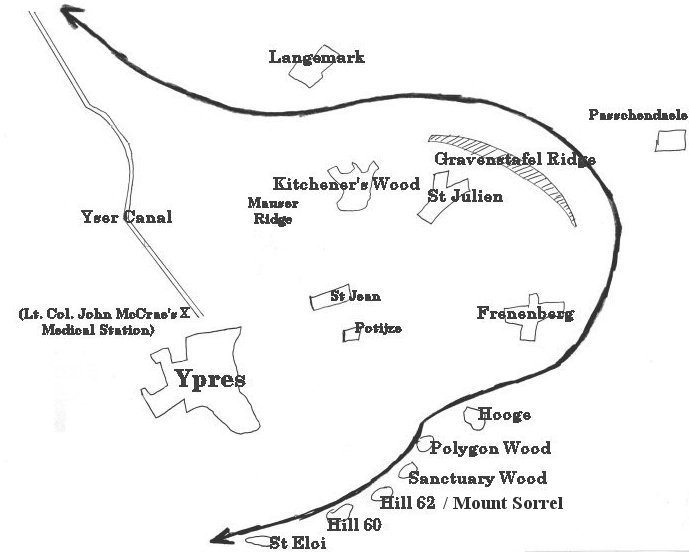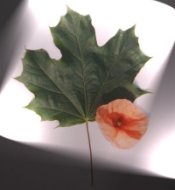
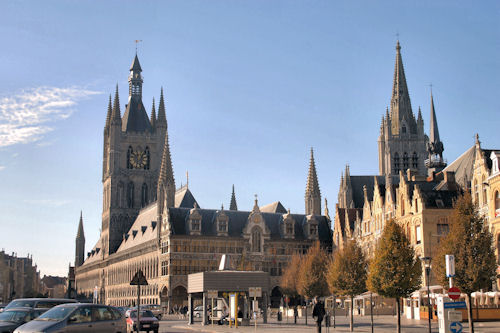
The Canadians
at St Julien
&
the Battle of 2nd Ypres
April & May 1915
The bravery and effort of the Canadians
displayed from April 22 to May 8 of 1915 was a turning point for our
nation.
Although
it is said - and rightly so - that Canadians experienced their first
sense of nationhood at Vimy Ridge, I would add that at Ypres in 1915 our
army experienced a true sense of pride and a confidence in their ability
to succeed against any adversity.
During October and November of 1914 the French, British and Belgian forces had stopped the advance of Germany's Schlieffen Plan, at great cost to both sides. The result of the battle of "the First Ypres" had left each side in fixed trench positions with the strategic advantage favouring the defenders: the Germans.The line had stretched around the town of Ypres almost like a bubble. This salient would prove itself to be a deathtrap for the remainder of the war.
Although the War had begun in August of 1914, it should be realized that the Canadian entry into the war would take a few months. Men had to be recruited, trained, equipped and safely transported to Europe. After some final training at Salisbury Plain, England, the Canadian volunteers found themselves in France by February of 1915. They were then ordered to take up positions on the Ypres Salient in the Belgian Province of Flanders. By April of 1915, the Canadian First Division found themselves occupying a sector of the Allied front line with the British to their right and the French Algerians to their left. Unappreciated by the British High Command was the German plan to assault the Ypres Salient using their new weapon: poison gas.
On April 22 after heavy artillery, the Germans released almost 6,000 cylinders of chlorine gas from their line close to Langemark towards the Algerian and Canadian forces. The effect of the attack was devastating for the Algerians. Those that had not been killed fled leaving the Canadian left flank totally exposed.
The Order of Events
April 22 : The Germans
attack the Algerian positions to the left of the Canadians - unknown to
the German attackers, the Algerian withdrawal has left a 4 mile gap on the
Canadian flank.
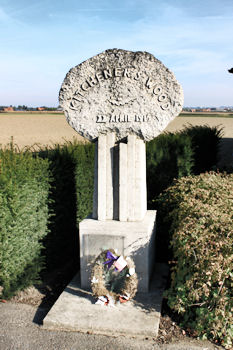
The Canadian 10th and 16th battalions make a bayonet charge into the German positions at Kitchener's Wood (located between the Canadian line and the German positions outside of Langemark). After fierce hand to hand combat the German positions are overwhelmed causing the German command to question the effectiveness of their gas. This hesitation will save the Canadian line from certain devastation. The Canadians hold Kitchener's Wood until it is time to withdraw at morning's light and take back to their lines a previously captured British battery.
The Monument to The
Canadians
of Kitchener's Wood -April 22 & 23, 1915
In an effort to completely close the gap left by April 22nd's gas attack, the Canadian and British forces attempted to gain the higher ground at Mauser Ridge. Of the roughly 2000 Canadians that attacked that day about 850 were killed or wounded - including the commanding officer: Lt. Col. Arthur Birchall. The gap was closed but the price was very high.
Due to a misunderstanding on the part of British General Turner, the British reinforcements take up positions about 1 mile to the rear of the Canadians leaving their positions exposed and open to enemy attack.
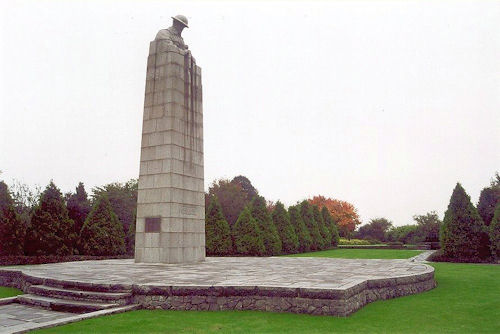
As the gas and carnage swept across the area the Canadian 5th & 8th Battalions held their ground. After deciding to shorten their line by repositioning themselves at the small town of Gravenstafel, the Canadian successfully stopped the German advance until relief came on April 26.
May 8 : The Princess Patricia's Canadian Light Infantry are attacked at Frezenberg and Bellewaerde Ridges.
After withstanding a heavy artillery assault Princess Patricia's Canadian Light Infantry (P.P.C.L.I.) repulsed the German attack mainly with the use of small arms and rifle fire. As the day progressed both manpower and amunition were become a grave concern. By the end of the final German assault, the P.P.C.L.I. was reduced to 4 officers and 150 men. Facing unbelievably greater numbers, the Canadians once again, had held the line. The German offensive of the 2nd Ypres had ended. When the P.P.C.L.I. finally were relieved, they were cheered by the other regiments as they moved back toward Ypres
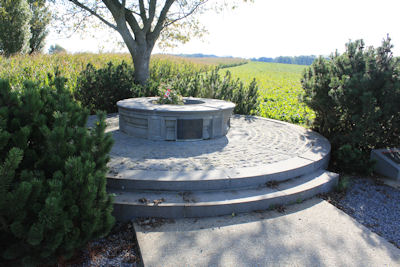
The Princess
Patricia’s Canadian Light Infantry
Memorial at Bellewaerde
* * *
additional information and Photographs can be found on TheGreatWar.ca's
Photo Gallery and
Touring Vimy and
Flanders sections.

....
to Canada & the Great War
| Quick Links on TheGreatWar.ca |
| Home |
| Flanders & Vimy Ridge |
| Major Canadian Engagements |
| Beaumont-Hamel |
| TheGreatWar Links |
| Canadians Shot at Dawn |
|
Email
|
last updated: January 10, 2011
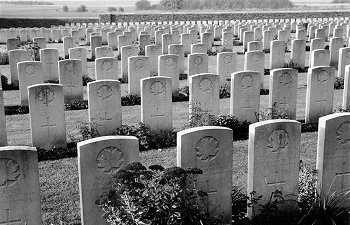
additional information and Photographs can be found on TheGreatWar.ca's
Photo Gallery and
Touring Vimy and
Flanders sections.

....
back to Canada & the Great War
